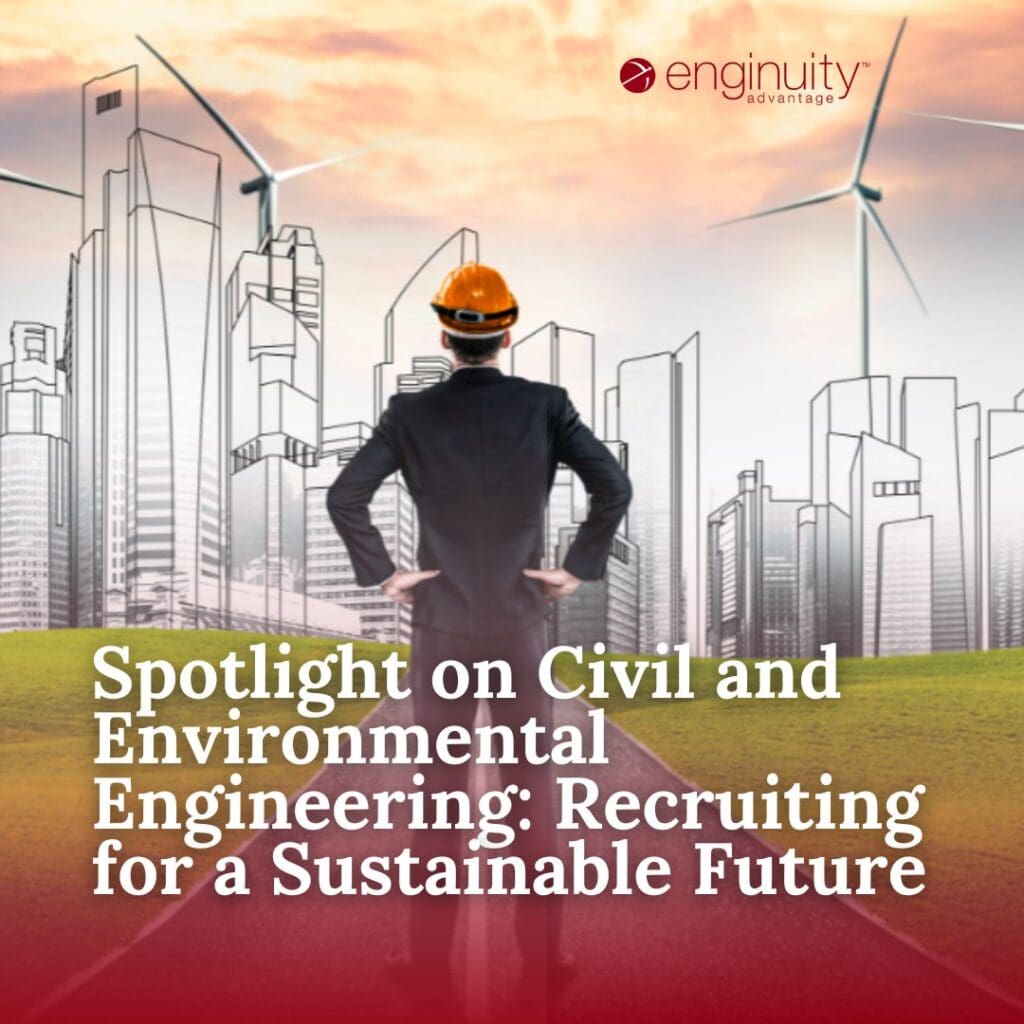Civil & Environmental Engineering: Recruiting for the Future

In a world grappling with the dual challenges of climate change and rapid urbanization, the roles of civil and environmental engineers are becoming increasingly indispensable. Climate change, characterized by rising temperatures, erratic weather patterns, and rising sea levels, poses significant threats to our natural and built environments. On the other hand, urbanization, marked by the swelling of city populations and expansion of urban infrastructure, intensifies these threats by increasing carbon emissions, reducing green spaces, and straining resources. By 2050, it’s projected that more than two-thirds of the world’s population will live in urban areas.
Together, these phenomena underscore the urgency of sustainable solutions. As we navigate these intertwined challenges, civil and environmental engineers emerge as the vanguards, crafting innovative strategies to ensure our cities are resilient, sustainable, and prepared for the future. In this spotlight, we’ll delve into the significance of these sectors and the essential skills candidates need to pioneer transformative change.
Navigating the Global Landscape
The current trajectory of urban growth is staggering. Cities, as the epicenters of human activity, are expanding to accommodate a growing global populace. This urban sprawl, more than 4 billion people live in urban areas globally, while a testament to human progress, introduces complex challenges ranging from infrastructure development to efficient resource allocation.
According to the U.S. Bureau of Labor Statistics, the employment of environmental engineers is projected to grow by 6% from 2022 to 2032, which is faster than the average for all occupations
Simultaneously, the pressing issue of climate change demands immediate and effective solutions. The manifestations of this global phenomenon—rising sea levels, erratic weather patterns, and temperature anomalies—underscore the urgency of sustainable engineering solutions.
Civil and Environmental Engineering: The Cornerstones of Progress
Civil engineering, as you well know, is not just about erecting structures. It’s about designing resilient infrastructures that cater to the needs of today while being prepared for the challenges of tomorrow. It’s about ensuring that our bridges, roads, and transportation systems are not only functional but also sustainable.
Environmental engineering focuses on harmonizing progress with nature. This field is at the forefront of ensuring clean water, breathable air, and the transition to renewable energy sources. It’s about crafting solutions that prioritize our planet’s well-being without compromising on development.
Talent Acquisition: A Strategic Imperative
Recruiting the right talent is paramount. The demand for expertise in civil and environmental engineering is not just about academic excellence but about holistic competencies.
Key Competencies to Consider:
- Analytical Depth: In the face of complex global challenges, it’s not enough to rely solely on textbook knowledge. Engineers today must possess a profound analytical depth that allows them to dissect real-world problems, understand their intricacies, and devise solutions that merge traditional wisdom with forward-thinking innovation.
- Technical Expertise: While a strong grasp of tools, software, and foundational engineering principles is essential, it’s how one applies this expertise that truly matters. The best engineers can leverage their technical skills to create groundbreaking solutions, pushing the boundaries of what’s possible in their field.
- Team Collaboration: Engineering isn’t a solitary endeavor. The most impactful solutions often arise from the collective brainpower of diverse teams. Engineers must, therefore, be proficient at collaborating, bringing together different perspectives, and harnessing the strengths of each team member to achieve a common goal.
- Sustainability Focus: As the world grapples with environmental challenges, a commitment to sustainability is paramount. Engineers must be champions of sustainable practices, advocating for and integrating green technologies into their projects. This focus ensures that our built environments not only serve us today but also benefit future generations.
- Adaptive Learning: The world of engineering is dynamic, with new technologies and methodologies emerging regularly. To stay relevant and effective, engineers must possess an insatiable curiosity and a commitment to continuous learning. This adaptability ensures they’re always equipped with the latest knowledge and skills, positioning them at the cutting edge of innovation.
Enginuity Advantage: Your Partner in Recruitment
At Enginuity Advantage, we understand the intricacies of recruiting for specialized engineering roles. Our approach is tailored to align with your company’s ethos and vision. We don’t just seek candidates; we aim to find future leaders who resonate with your commitment to excellence and sustainability. Civil and environmental engineering are more than just disciplines—they are the bedrock of a sustainable future. As an engineering company at the helm of innovation, your role in navigating and addressing the challenges of urbanization and climate change is invaluable.
Unlock Dream Careers & Elite Talent: Just One Click Away!


